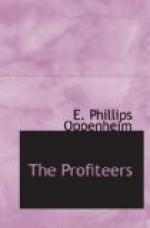The tears which stood in her eyes were of unalloyed content,—the drama so close at hand was forgotten. Their hands remained clasped for a moment. Then he left her.
Back into that room with its strange mystery of shadows, its odour of mingled tragedy and absurdity. Grant rose from a high-backed chair guarding the table, as Wingate approached. The latter glanced towards the three men crouching around the table. Their white faces gleamed weirdly against the background of shaded light. There were black lines under Dredlinton’s eyes. He made a gurgling effort at speech,—his muttered words were only partly coherent.
“I resign! I resign!”
Wingate shook his head.
“I am afraid, Lord Dredlinton,” he said, “that you are in the hands of your fellow directors. One may not be released without the others. Directly you can induce Mr. Phipps and Mr. Rees to see reason, you will all three be restored to liberty. Until then I am afraid that you must share the inevitable inconveniences connected with your enforced stay here.”
Phipps lurched towards him with a furious gesture. Wingate only smiled as he threw himself into his easy-chair.
“Wheat is falling very slowly,” he announced. “Every one is waiting for the B. & I. to sell.—You can go now, Grant,” he added, “I will take up the watch myself.”
CHAPTER XXII
Wingate, notwithstanding his iron nerve, awoke with a start, in the grey of the following morning, to find his heart pounding against his ribs and a chill sense of horror stealing into his brain. Nothing had happened or was happening except that one cry,—the low, awful cry of a man in agony. He sat up, switched on the electric light by his side and gazed at the round table, his fingers clenched around the butt of his pistol. Dredlinton, from whom had come the sound, had fallen with his head and shoulders upon the table. His face was invisible, only there crept from his hidden lips a faint repetition of the cry,—the hideous sob, it might have been, as of a spirit descending into hell. Then there was silence. Phipps was sitting bolt upright, his eyes wide open, motionless but breathing heavily. He seemed to be in a state of coma, neither wholly asleep nor wholly conscious. Rees was leaning as far back in his chair as his cords permitted. His patch of high colour had gone; there was an ugly twist to his mouth, a livid tinge in his complexion, but nevertheless he slept. Wingate rose to his feet and watched. Phipps seemed keyed up to suffering. Dredlinton showed no sign. Their gaoler strolled up to the table.
“There is the bread there, Phipps,” he said, “a breakfast tray outside and some coffee. How goes it?”
Phipps turned his leaden face. His eyes glowed dully.
“Go to hell!” he muttered.
Wingate returned to his place, lit and smoked a pipe and dozed off again. When he opened his eyes, the sunlight was streaming in through a chink in the closed curtains. He looked towards the table. Dredlinton had not moved; Rees was crying quietly, like a child. An unhealthy-looking perspiration had broken out on Phipps’ face.




